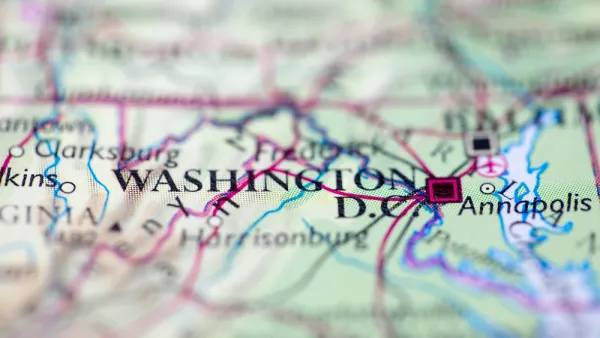The blog Greater Greater Washington has been instrumental in furthering the discussion of land use in D.C. Rachel Weiner profiles its controversial founder, David Alpert, whose lack of formal planning experience is no impediment to his ambitions.
"Part news site, part advocacy group, part community newsletter, Greater Greater Washington is like an unending handbook to being an engaged D.C.-area resident, attracting more than 100,000 unique visitors a month," writes Weiner. "While the blog has attracted an array of contributors, it’s the vision of Alpert — a former software engineer with no formal planning experience — that has shaped the views of both citizens and politicians on what a better city means and how to get it."
"In the process, he’s also become a symbol of the divides in the city between development and preservation, young and old, bikes and cars, black and white. Criticism of the blog often essentially boils down to: Who does this guy think he is?"
A recent arrival to the Nation's Capital who "at first glance...fits perfectly the stereotype of the careless gentrifier," the Harvard dropout and former Google developer nevertheless "sees his blog as an advocate for the problems bedeviling the city’s poorest residents: unemployment, educational inequality, a lack of affordable housing."
"Blog posts focused on economic inequality don’t always get the same attention as, say, a map of CityBike usage," notes Weiner. But, "Alpert and his team think they can change that, in part by framing social diversity as a desirable part of city living for wealthier residents."
“I think that a lot of people actually want a neighborhood with a mix of races and income levels and types of people,” Alpert said.
FULL STORY: David Alpert: His vision for Greater Greater Washington and the District

National Parks Layoffs Will Cause Communities to Lose Billions
Thousands of essential park workers were laid off this week, just before the busy spring break season.

Retro-silient?: America’s First “Eco-burb,” The Woodlands Turns 50
A master-planned community north of Houston offers lessons on green infrastructure and resilient design, but falls short of its founder’s lofty affordability and walkability goals.

Delivering for America Plan Will Downgrade Mail Service in at Least 49.5 Percent of Zip Codes
Republican and Democrat lawmakers criticize the plan for its disproportionate negative impact on rural communities.

Test News Post 1
This is a summary

Test News Headline 46
Test for the image on the front page.

Balancing Bombs and Butterflies: How the National Guard Protects a Rare Species
The National Guard at Fort Indiantown Gap uses GIS technology and land management strategies to balance military training with conservation efforts, ensuring the survival of the rare eastern regal fritillary butterfly.
Urban Design for Planners 1: Software Tools
This six-course series explores essential urban design concepts using open source software and equips planners with the tools they need to participate fully in the urban design process.
Planning for Universal Design
Learn the tools for implementing Universal Design in planning regulations.
EMC Planning Group, Inc.
Planetizen
Planetizen
Mpact (formerly Rail~Volution)
Great Falls Development Authority, Inc.
HUDs Office of Policy Development and Research
NYU Wagner Graduate School of Public Service



























